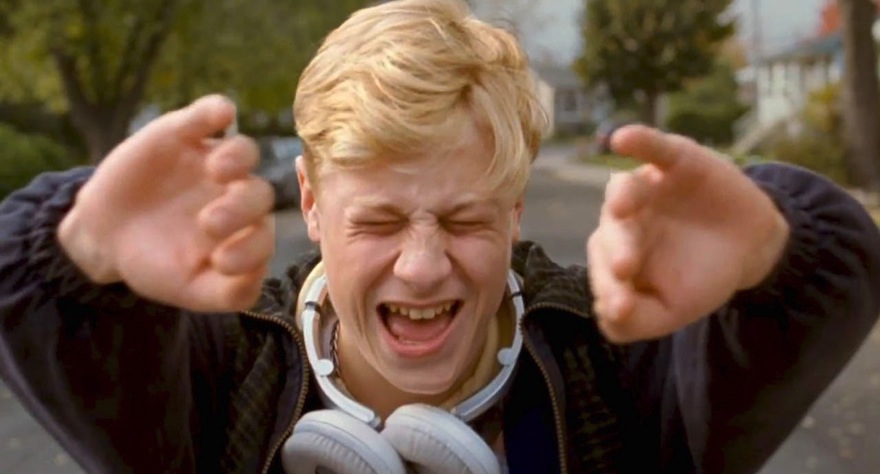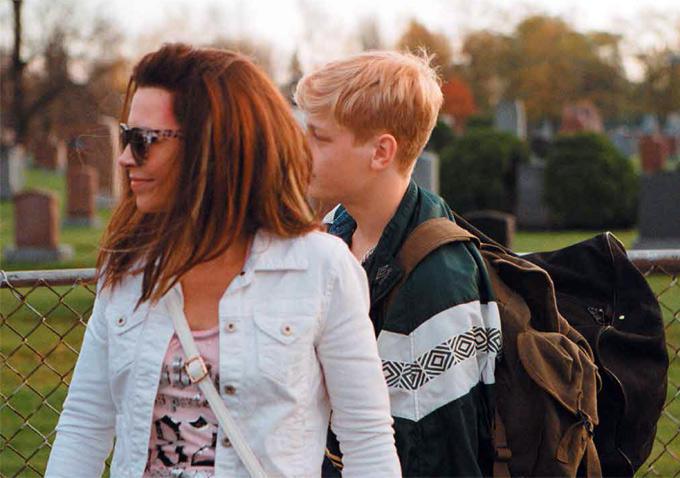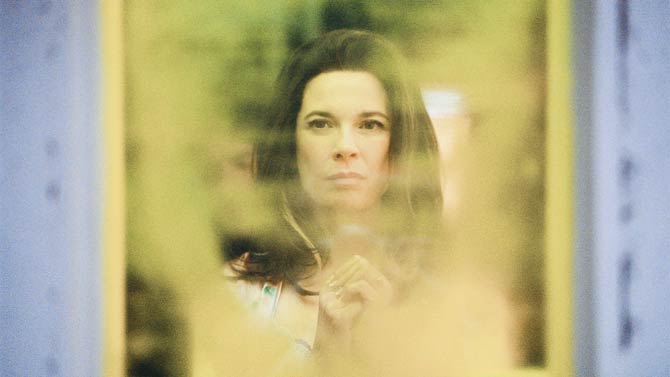Xavier Dolan On His Film ‘Mommy’ & Relating to Women Who Fight

Two months shy of his 26th birthday, Xavier Dolan is traveling across the United States for press on his latest feature Mommy. Already released in several European countries as well as the Québécois Dolan’s home of Canada, the film will see an American release on January 23rd. Mommy is Dolan’s 5th film as a director, a remarkable achievement considering his relative youth; however, with Mommy, Dolan has gained increased notoriety outside of film festival circuits. After splitting the Jury Prize at Cannes with Jean-Luc Godard’s Goodbye to Language 3D, Mommy was selected as Canada’s official entry into the Foreign Film race for the upcoming Academy Awards.
Although his film failed to collect an Oscar nomination, Dolan remains hungry to immerse himself in the art of filmmaking. He speaks passionately about the importance of actors, and his desire to act. Speaking to a group of reporters, including Way Too Indie, Dolan discusses his lack of culture, how he’s evolved as a director since his debut I Killed My Mother, and growing up surrounded by women.
You were thinking of taking a break from filmmaking to go to art school?
I would love that though.
But you’re not going to do it?
Well, I can’t. The only time in my life when I could do that was last– this fall, just for one term. And I can’t anymore because I invested all my time in traveling, being in Los Angeles for the Oscars and the Golden Globes, which worked out so fine. I’m kidding. So no, it was worth giving it a try, but that project with going back to school was for this fall.
Do you feel different when you receive all this acclaim, and you receive the award [at Cannes] at the same time as Godard, can you be insecure?
I was never insecure. I’m passionate about what I do, and I love working with actors, and I love acting, writing these stories and nothing has ever made me feel insecure. Some reviews have hurt me but they’ve always been educational at the very least. The thing I’m the most satisfied with is that when I read the reviews on the movie, I don’t see the plethora of influences listed. People have rejoiced in pointing at, “This. This. This.” That’s always been very tiresome in the way that I don’t have a very large culture. So the influences that people had identified were almost systematically wrong.
Does it make you though want to go back and look at those films?
Of course, but when? At night?
Yeah! 3 in the morning.
Yeah, no, I’d rather get some sleep for the interviews at 9am. I mean, it will be a long life of watching films. But I started watching more serious films… when I was maybe 15 or 16. And I started directing movies when I was 19 so there was only this much time that I could spend really bingeing films and trying to catch up on a century of filmmaking.
And you’ve been making films consistently.
Ever since.
Why do you think you’re so prolific? Has it been almost one per year?
Yeah. Five in five years, but not necessarily… there have been two in one year twice. Anyway. I don’t know, I’ve just followed my need for films and sets and being in that adrenaline-driven journey of shooting a film. It feels like in between movies, I’m sort of waiting for something to happen. When I’m not working and creating movies, I’m standing by and just running circles.
Could you talk about the process of casting Antoine because it seems he could be totally innocent looking and at the same time the opposite, and go into a raging fit. It’s quite difficult to cast someone like that, could you talk about the process of casting him?
Yeah, it was a process of one second and a half. Let’s be honest, it wasn’t about finding a kid who would be ADHD and violent and impulsive. I would obviously never see that in someone. The thing is that we shot this music video [for Indochine’s “College Boy”] where he was this character who was a bullied kid, which is pretty much the opposite of what he is in Mommy, where no one will bully that child. But it was not in his performance, but his attitude on the set.
He was such a professional young man, and he was so kind, and listening. Somehow he wasn’t exactly that way on Mommy. He was way more rambunctious, I guess. We had this complicity so he would allow himself more familiarity which is great, but he was a little less calm, I’d say, than on the “College Boy” set. So the process of casting him was just believing we could do it together and that he could listen to my directions and that he would bring that character to life, which he did.

Compared to some of your other films, this is a bit more adrenalized. Faster paced, faster edited in some ways. Obviously the boisterous scenes. Is that a result of just the particulars of this film, or have you decided to tighten up your process, and I wonder if it’s a reflection of the film itself or is it a reflection of you?
No, I think it’s honestly more about the story and the script. A lot of people have told me how Laurence is long but Laurence is a film that would have felt twice as long if it would have been 25 minutes shorter. It’s a film that needed, whatever the opinions of people are, it’s a film that needs to span this much time because the story itself spans that many years.
There’s nothing worse for me than trying to tell a long story in a really short way, in a sort of skipped fashion. Where it becomes anecdotal, and it can never have any pace in stalling itself. You’re always jumping in motion. But Mommy was about the hysterical rhythm of these people’s lives. So the film had to mirror that. It isn’t the result of…
An internal process?
[nods] It’s more just addressing what the film itself and the script were calling for, which is a fast paced edit and constant motion.
Do you heavily storyboard your films or do you just turn on the camera and let the actors be for some of the more powerful scenes?
Somewhere in between I guess. I have a shot list, having a shot list does not keep the actors from being. But I’ve worked with a director as an actor who never knew how he would shoot a scene until he saw the actors block it. I don’t work that way. I know that I want a certain shot, that I want a certain dolly, that I want this and that and this and that but of course, I’ll always adapt myself to what the actors do. And if they bring something that needs me to adjust the direction we are taking or the shot list, everything is changeable. I’m not being psycho-rigid about what my needs are. The story was character driven and it’s always about the acting. It’s always about the actors.
What inspired you to place that introduction of a fake health care law on the beginning of the film?
Well, at a certain stage in preproduction, I saw this specialist, this doctor. We had a conversation about Steve’s character because I was curious to see if the psychological and emotional arcs made sense, which they did, they made sense. But then we started scouting locations and we went to a true correctional facility, and the principal who took us through the place, took us around, told me that the first scene in his humble opinion didn’t make sense. Because the movie starts with a correctional center. Steve is being expelled because he’s misbehaved, which a correctional center would never do.
When a kid misbehaves in a correctional center they just increase the level of surveillance and attention they can produce for that child. Their mandate is the protect the citizens against these children, and to protect the children against themselves. Then I realized that Mommy would never make sense sociologically and legally speaking and that I had a choice to make: telling a story that was rigorous in terms of research legally speaking, or just the story that I wanted to tell which was the story of mother love and friendship.
Had I not opted for that, I would have had to incorporate all these social workers, police officers, court scenes… it’s not a documentary. So I had this fictional Canada thing in the beginning to sort of get rid of the eventual remarks from people that worked in correctional centers or whatever. Not only that, I thought that this law would create and would illicit an actual moral dilemma, which I think is crucial for Die because of course a mother would never drop her child. That’s what she will say.
But I personally have friends who have child [sic] who have behavioral disorders or are mentally ill or are autistic, you know? They told me that what broke their hearts about reading the script, because some of them were actresses in the script. Not the leads, other roles. And they just told me that it broke their heart. What was most heart-wrenching for them was not the ending or this or that particular scene. [It was] when she drops him in the hospital. They identified and told me, “it’s awful to say that I often think about that. And that I see myself… doing that. I don’t think about that all the time but I do think about it, I’d be lying if I told you I didn’t think about that.”
So hearing that from a mother made me think, “Well then there’s got to be a choice.” Because when you can’t do something, when it is illegal, of course you tell everyone, “I would never do that.” But when it’s possible, it’s another conversation.
Was it a conscious choice not to reveal more of Kyla’s background?
I don’t know I just thought it was not necessary to stress anything about her past. I gave away all the things that I thought were interesting to expose. If we take that scene for example when she jumps on him, jumps on his throat. When he aggresses her, I guess, and snatches the heart locket, her reaction is so physical. She seems so incapable to produce that sort of anger in that sort of energy that it comes from really, really, really deep and far. I think that someone who loves film, and loves watching film, cannot help but understand this necklace is associated with death. It’s the first part of understanding Kyla’s mysterious past.
Then there’s a scene right after where she’s changing because he’s pissed on her ‘cause he was scared. She’s putting on some other clothes and you can see by her bed table a display of frames, family photos, and then you see the photo of a little boy. And you’ve seen her girl, you’ve seen her daughter. We’ve talked about the daughter, where is the little boy? We’ve seen the girl’s room, we’ve seen the daughter’s room, so where is the boy? He’s dead.
It’s not about Kyla’s past, it’s about Kyla’s future. She is seeking revival and resurrection through that new friendship within that new household. So that’s why I thought we did it. And with Suzanne because Suzanne has helped build this character’s past. When we embarked on Mommy nothing of that was really clear. There were some lines here and there to explain and also, what we liked is that she never told Die about her past. She never told her either that she’s driving the car at the beginning of the film and she sees the car accident.
Kyla is on the car accident scene. She doesn’t tell Die, “Hey by the way, I was right behind you when you had that accident I saw that happen.” It’s something you would mention, you would bring that up, you would say, “I was there, how weird?” But she doesn’t reveal anything about herself, her life. Because it’s all about Die. It’s about how Die and Steve are impressive to her and she envies their freedom somehow. Which is ultimately a cheat because they are not free. But everybody has an influence.

If I can ask about Anne and Suzanne, they were both actresses who were in your first film and I’m wondering how your working relationship has evolved as you’ve gained a little experience?
Well, there’s two way of looking at it I guess. Yes, the fact that I’ve learned more about acting. In Laurence Anyways I wasn’t acting so I literally spent a year of my life [on it], sort of. It was 75 days of shooting, a very long shoot, and I was just watching actors. Watching their craft, watching their strengths, their weaknesses. Learning how they work, and how they think and operate and everything. So then in Tom At the Farm I tried to apply these things to my own craft. And then Mommy was number five, and by then I had learned enough new things that the experience with Anne was completely different from that of I Killed My Mother.
But what’s also changed is that within these years I’ve grown closer to both these women. And I know them in their intimacy, and I know them in their private lives, and I know how they laugh and how they cry and who they are. So what’s fun about this is not only to write characters as far away and as different as what they’ve done in their careers, but also as different as can be then who they are in their lives.
One thing that’s consistent in your films is that they tend to be about a character stepping out of their cocoon. Would you agree and can you elaborate on that?
Yeah, they’re about characters breaking free, breaking the rules, but also trying to fit in society and being ostracized by that society because they are different. It’s always the same theme coming back.
Most of your films deal with outsiders, and I was wondering if growing up gay made you feel like an outsider. Do you think that will change in the near future?
No, I think that the themes that mark you and prey on your mind all the time and concern you and touch you are related to the things that have left a print on you when you were a child. So being gay as a child and [laughs] today still has brought me moments and scenes of being misunderstood and feeling like a misfit. Or finding my voice and my path, trying to define myself in the eyes of others, in the eyes of mothers, in the eyes of women, in the eyes of men. So that’s why I feel like I have a natural inclination towards characters in that exact same position. Women are, like gay men, trying to fit within society, which is a space that is shaped for men, whatever the progress seems like it is, it’s still defined by the predominance of males.
I think women are trying to fit in, and are fighting, and that’s why I associated with women characters. It is through women characters that I feel like I can most effectively and most efficiently [express] my fights and my claims. I hope it’s clear and it’s not lost in translation. What I’m trying to say is that in my life I have been watching women fight a lot more than I’ve been watching men fight but of course we’re not defined by our gender, we’re defined by our quest. Who we are as individuals. But it so happens that in my childhood, I was surrounded by women and they are the figures I saw fighting for who they were and are. So naturally, I do write for women and mothers, I guess.
What’s next? Are you writing a project? Acting for someone else in a project? What are the new goals, the next set of goals?
I think that within the next two years I’ll be working on my own movies as a director, a lot. There might be a project from a script I’ve not produced. But I really need to act. Like, if I want to keep having a healthy relationship with actors, I need to act myself, because I give a lot of my time and energy and writing dialog for actors, and finding costumes for actors, and directing actors and working with actors, and filming actors, and lensing actors, and doing CGI for actors. At a certain point… I need to act myself, too.
